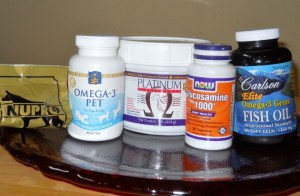Useful Supplements for Older Dogs
Many older dogs can benefit from the careful use of supplements to help address the slowing regenerative processes in their bodies. While a proper diet is always the foundation for good health, wise use of supplements can specifically address areas of special need (such as joint support) and may also decrease the need for harsh drugs as the dog ages (such as steroids or non-steroidal anti-inflammatory drugs, both of which take a toll on the liver and other organs).
Two of the best all-around supplements for aging pets are Omega 3 Fatty Acids and a chondroprotective supplement like glucosamine and/or chondroitin sulfate. Omega 3 Fatty Acids promote the anti-inflammatory processes in the body, with particular affinity for joints, skin, and brain. For dogs, the best source of Omega 3 Fatty Acids is from animal-based sources such as fish oil. Look for a high-quality, purified fish oil from deep water marine fishes such as sardines and anchovies rather than cod liver oil, which can only be given in a limited amount due to the high levels of Vitamin D and Vitamin A in it (which can cause Vitamin A toxicity if given in a high enough dose). Fish oil from cold-water fishes contains more Omega-3 Fatty Acids compared to cod liver oil, and can be given at a higher, more effective dosage. For fighting inflammation, look for a fish oil with a high EPA content. Glucosamine and chondroitin sulfate have both been shown to help some cases of arthritis (but not all), and both are crucial components of healthy joints. Aging slows a joint’s ability to repair and remodel the cartilage matrix, and supplementing with chondroitin and/or glucosamine is thought to help with this process.
Digestive supplements may be useful for dogs that truly have a problem digesting or assimilating food. If a dog is being fed a poor quality food, switch to a higher quality food first before experimenting with digestive enzymes. An unprocessed raw diet will provide the highest degree of digestibility and the least amount of filler, and many digestive issues simply disappear once the dog is eating a more natural diet. Probiotics are good for dogs that suffer from occasional digestive upset, but care must be taken to select the benefical bacteria strains that are actually useful to dogs.
Other common useful supplements for various body systems include:
Joints: glucosamine, chondroitin, MSM, Natural Eggshell Membrane, Omega-3 Fatty Acids
Skin and coat: zinc, Omega-3 Fatty Acids, Vitamin E
Heart: L-carnitine, CoEnzyme Q10, Omega-3 Fatty Acids
Liver: Milk thistle
Digestive System: probiotics, digestive enzymes
Immune System: Vitamin C, antioxidants, Omega-3 fatty acids
How to Tell a Supplement Works
Some supplements like glucosamine/chondroitin may need to be taken for several weeks or months before a difference is seen in the dog. Others may show a difference in as little as a week. Either way, introduce one supplement at a time (rather than all at once) and allow a reasonable amount of time for the dog’s body to adjust. Signs that a supplement is benefiting the dog may include:
• Improved appearance of skin and coat
• Improved mobility
• Increased energy
• Increased activity levels
Finding Good Supplements
When searching for a good supplement, quality matters. You want to ensure that you are getting what you pay for. Cheap supplements at discount stores may not undergo the same rigorous quality of testing as other brands, and while you are saving a few bucks you may also be using a supplement that has only a fraction of the active ingredient listed on the label. However, buying the most expensive brand does not guarantee quality, either. Look for supplements made by companies with good reputations for producing quality supplements, and that are independently tested for quantity and quality of active ingredients.
Also be skeptical of purchasing an “all-in-one” supplement that contains a plethora of vitamins, minerals, pain-relievers, fatty acids, and more. Many canine supplements lump all of these together and proudly proclaim the supplement’s ability to help a variety of conditions. However, the amount of many components is so low as to provide little therapeutic benefit to your dog! A typical German Shepherd dog, for example, needs approximately 1500mg of glucosamine and 1200mg of chondroitin in a supplement, and 1500mg of the Omega 3 Fatty Acid known as EPA. But many of the common canine supplements contain only a fraction of those amounts, even in their serving sizes for larger dogs.
Last but not least, always ask your veterinarian before beginning a new supplement for an older dog, particularly if your dog already is on various medications.
Happy supplement-searching,
CK


